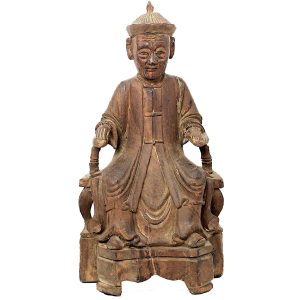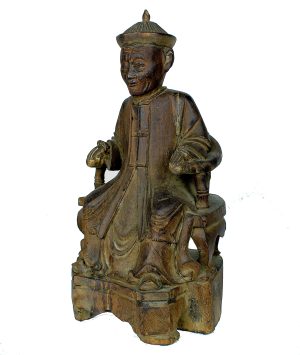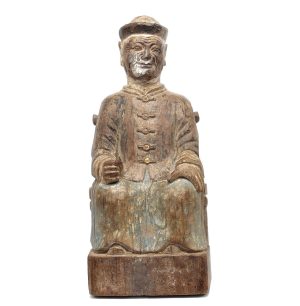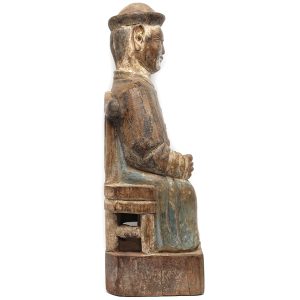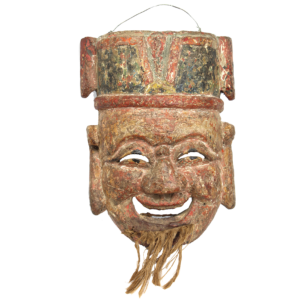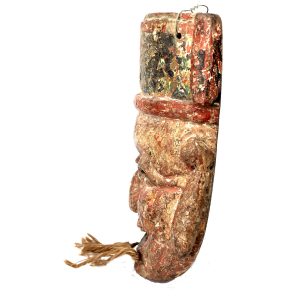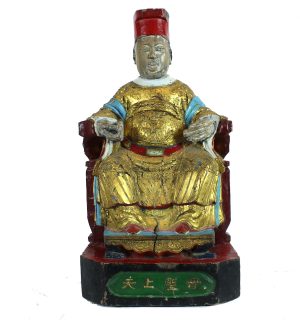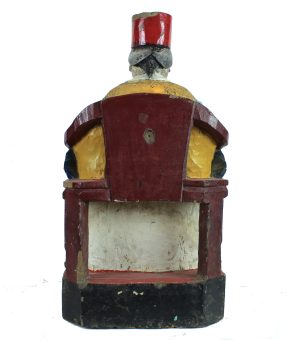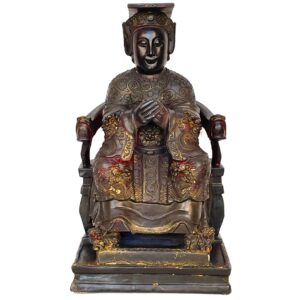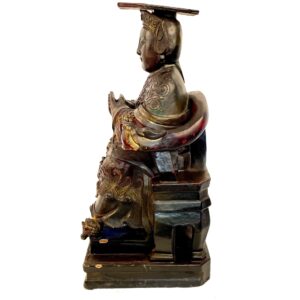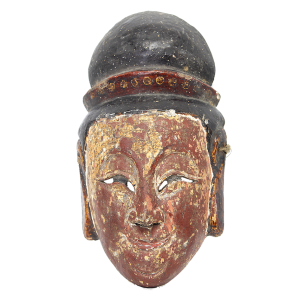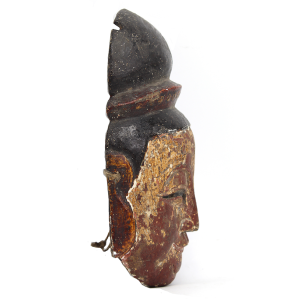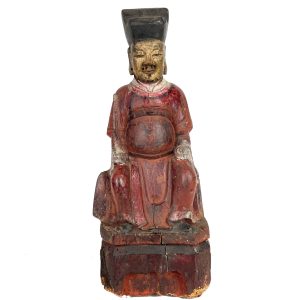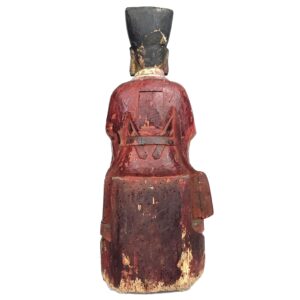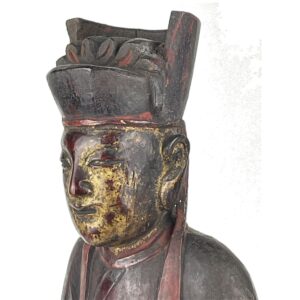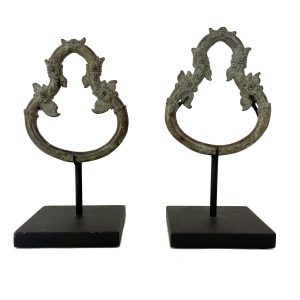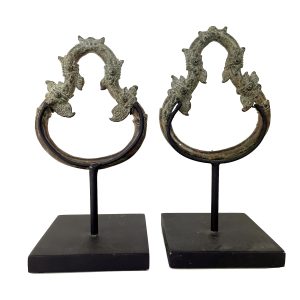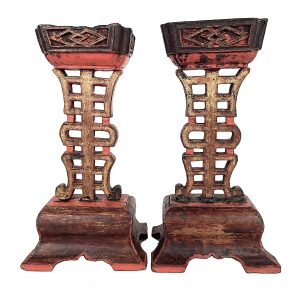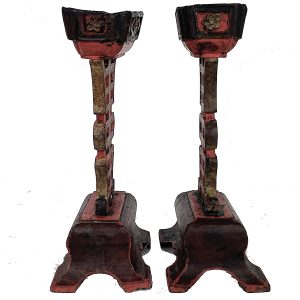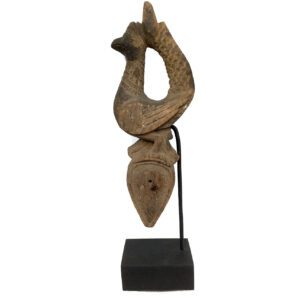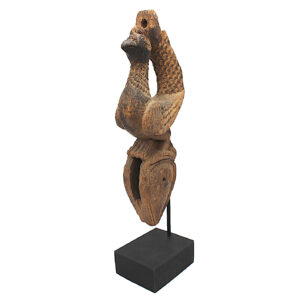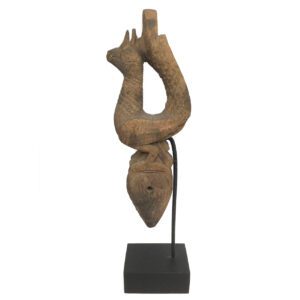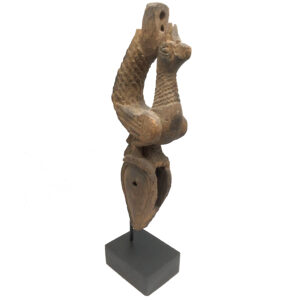Showing 61–72 of 202 results
-
Sale!


$695.00 Original price was: $695.00.$595.00Current price is: $595.00.
H: 12.75” W: 6.625” D: 5.75” | FREE SHIPPING within Continental u.s.
Masterfully carved ancestor mandarin official on horseshoe chair in the round with cabriole legs, considered a “marker of high status, finely dressed in long Mandarin coat and pointed rattan hat. Benevolent face was homage to a revered family member. It is one of our favorite ancestor figures.
-
Sale!


$595.00 Original price was: $595.00.$485.00Current price is: $485.00.
H: 11.5″ W: 5″ D: 4″ | FREE SHIPPING WITHIN CONTINENTAL U.S.
The finely carved ancestor figure in traditional Qing dynasty high neck Mandarin official’s long jacket with front buttons and official rattan woven headwear. The chair’s back slat was omitted as back carved cavity for consecration in an eye-opening ceremony
-
Sale!


$595.00 Original price was: $595.00.$475.00Current price is: $475.00.
H: 10.5” W:7.75” D: 3” | FREE SHIPPING WITHIN CONTINENTAL US
This antique Nuo Opera mask is Tudi Gong, benevolent Earth god with smiling animated face, long eyebrows, hemp beard and high decorative hat. With an honest gentle disposition, he symbolizing the power of good to defeat evil. Nuo popular in Ming/ Qing dynasties, there are few remaining troupes.
-
Sale!


$1,150.00 Original price was: $1,150.00.$875.00Current price is: $875.00.
H: 19.25″ W: 10″ D: 8.75″ |CALL 213-568-3030 OR EMAIL [email protected] FOR SHIPPING.
Seated imperiously on a horseshoe chair with carved title “Holy Mother in Heaven,” Mazu is depicted in the imperial style, with a regal flat topped headdress, elaborate robes with dragons, official’s girdle in red and gilt.
-
Sale!


$1,050.00 Original price was: $1,050.00.$650.00Current price is: $650.00.
H: 15.375” W: 8.625” D: 7.5” | CONTACT US AT 213-568-3030 or email [email protected] for SHIPPING.
Mazu, protector of sea, is portrayed as the imperially sanctioned “Empress of Heaven” on an elaborate, horseshoe shaped dragon throne, holding a hu tablet, with elegant dragon robes, official’s girdle, Empress headdress and small feet on gilt fu lion foot rest.
-
Sale!


$395.00 Original price was: $395.00.$325.00Current price is: $325.00.
H: 9.25″ W: 5.75″ D: 2.25″ | FREE SHIPPING WITHIN CONTINENTAL U.S.
Chinese Noa opera mask is likely a female zhengshen – a benevolent gods with kind and honest nature and gentle disposition -symbolizing the power of good to defeat evil. Age and heavy use
-
Sale!


$875.00 Original price was: $875.00.$495.00Current price is: $495.00.
H: 15.5″ W: 6.125 ” 4.125 D: ” | FREE SHIPPING WITHIN CONTINENTAL U.S.
Carved ancestor figure as an official sits on a backless chair with a decorative pedestal in official’s attire holding a long slender curved hu-tablet, all signs of his office and status. He is vibrantly painted in red, the color of fu, as a wish for prosperity and status.
-
Sale!


$985.00 Original price was: $985.00.$695.00Current price is: $695.00.
H: 15″ W: 6.5″ D: 5.5″ | EMAIL [email protected] OR CALL 213-568-3030 FOR SHIPPING COST
This excellently carved ancestor civilian official with gilt highlights was commissioned to be place on a home altar for veneration and impress those who viewed it and to honor the venerated ancestor’s persistence, success, status and power.
-
Sale!


$1,350.00 Original price was: $1,350.00.$785.00Current price is: $785.00.
Each H:4.675 ” W:3.875 ” D:.5 ” | FREE SHIPPING WITHIN CONTINENTAL U.S.
Pair of bronze palanquin rings to transport Khmer Empire royalty and elite decorated with a lotus motif found in Lopburi, Thailand, the western most Khmer outpost.
-
Sale!


$295.00 Original price was: $295.00.$165.00Current price is: $165.00.
H:9.25 ” W: 5.25 ” D: 3.5 ” | CALL 213-568-3030 OR EMAIL [email protected] FOR SHIPPING.
Pair of oil lamps for good fortune with diamond shaped double lozenge meaning many treasures, and plum blossoms, symboling the Five Happinesses – wealth, health, longevity, peaceful death and love of virtue.
-
Sale!


$245.00 Original price was: $245.00.$185.00Current price is: $185.00.
H: 13” W: 3.75” D: 2.625” | FREE SHIPPING WITHIN CONTINENTAL U.S.
Burmese teak heddle pulley surmounted by a graceful peacock that symbolizes wholeness, combining colors and fleeting nature of all things. Based on old animistic beliefs, heddles are decorated with auspicious animals providing the weaver protection, assuring good quality weaving and pleasing the gods.
-
Sale!


$245.00 Original price was: $245.00.$175.00Current price is: $175.00.
H: 14″ W: 2.675” D: 3.5” | FREE SHIPPING WITHIN CONTINENTAL U.S.
This elegant heddle pulley carved from a single piece of Burmese teak is topped by a peacock, which in Buddhism represents the short-lived nature of all things. In Burmese animistic traditions, it auspicious animal images protect the weaver, assure quality weaving, and please the gods and spirits. Finely weathered from time and use.
End of content
End of content

